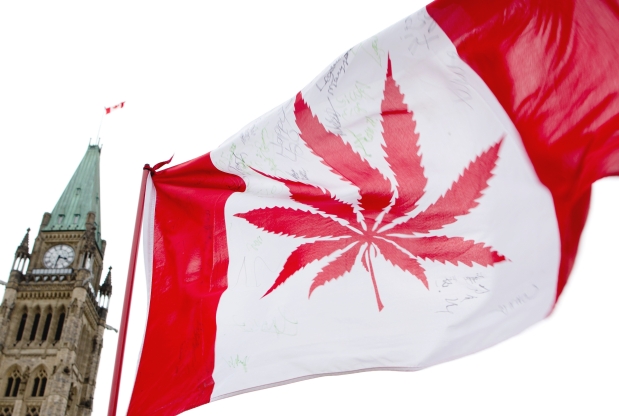Canadians love the superstition that bravely ignoring our horrid weather will change it for the better. The confusion of correlation and causality is a relatively harmless affectation for a wind-chilled people – save for, say, the drunken showoffs at the annual Polar Bear Swim who won’t come out of the frozen lake on New Year’s Day until they turn hypothermic.
What is not in any way so innocuous is the way in which our aptitude for self-delusion has steadily crept into the way we regard far more serious matters, up to and including things as essential to peaceful democratic order as the rule of law. Watch newsfeeds critically and see if cold doesn’t rise in your spine at the propagating attitude that the laws of the land are whatever our particular myth of the moment wants them to be.
This a very different thing from the bone deep human habit of law breaking. The paradox of the law breaker, after all, is implicit acknowledgement that a law at least existed to be broken. Nor is it, as the fevered imagination of the progressive left would have it, a sudden urge for civil disobedience among mystically “woke” citizens joining a popular rebellion against patriarchal capitalist colonialist settler oppression.
No. The sine qua non of the long and glorious tradition of civil disobedience requires holding such respect for the rule of law that one is willing to grant its legitimacy to punish those who break it. Socrates drank the hemlock. St. Thomas More went willingly to the scaffold. Martin Luther King Jr. was able to write his gorgeous Letter From Birmingham City Jail because he was in Birmingham City Jail as the accepted price of his fight against American racism.
What we see now is not that. Not even close. It is the pernicious (dis)regard for the law as “a ass – a idiot,” in the immortal words of Mr. Bumble, just because you happen not to like it. Ad hoc, situationally-defined injustice, in funhouse mirror fashion, has become moral justification for law-breaking. We see this from pot to pipelines to pirate ride-sharing, and a myriad of places in between.
Canada, for example, is now the proud parent of a higgledy-piggledy regime of marijuana legalization for the greater glory of stoners from sea to sea to sea. Bully for us. We’ve now democratically decided to give public license to yet another addictive intoxicant to complement drinking our faces off and being unable to look up from our smart phones long enough to hold a conversation that doesn’t sound like Mumbles the Piano Player talking to his cat. Huzzah! Huzzah! Free at last.
But consider one of the primary arguments that propelled this majestic leap to liberty. It was the alleged iniquity of “making criminals” of Canadians who bought, sold, or wrapped their wooly mittens around bags of pot. What? What “making criminals” of them? They were criminals. They made criminals of themselves.
Criminals are people who break the criminal law. And the criminal law prohibited the sale, purchase or possession of marijuana. It did so for the 51 years between the Le Dain Commission first recommending decriminalization and formal legalization this week. But wasn’t it a bad law? Wasn’t it an unjustified law? An ass – an idiot – law?
Well, in the ancient Roman civil formulation, lex dura sed lex: the law is hard; it is the law. The beauty of democracy, of course, is that we can freely work to soften it, adjust it, or eliminate it entirely if we choose. What we can’t do, if we are to protect democracy itself, is insist the laws do not exist, or don’t apply to certain groups, or if we can’t quite manage that stretch into unreality, claim their mere enforcement equals injustice.
We can’t…except, it seems, in contemporary Canada. Here, even some Members of Parliament, the very people charged with making laws, appear to have decided they can, willy-nilly, act according to the new discovered principle of convenient legal non-existence. Thus, Green Party leader Elizabeth May flagrantly defied a court order safeguarding the Kinder Morgan pipeline company from criminal protests at its Burnaby B.C. premises. She was led from the site by police and charged with contempt.

In fairness, May took her lumps, pleaded guilty, and paid her fine. Still, her behaviour was indisputably part of a larger process that has left Canadian taxpayers on the hook for billions of dollars that the federal government must spend to buy and build the pipeline after Kinder Morgan walked away from the project. Her disregard for the rule of law has contributed to putting the public purse at serious risk. Much worse is her use of her public profile as a lawmaker to give legitimacy to that disregard. If a lawmaker believes democratic law can and should be broken just because she and her friends have invented some alternative universe of justice, what are non-lawmakers to think?
Thanks to role models like May, we appear to have started thinking is that we can simply make up the laws as we’d like them to be. A literally dead serious example of that involves Dr. Ellen Wiebe, an activist for so-called Medical Aid in Dying, who entered an Orthodox Jewish nursing home in Vancouver last winter and euthanized an elderly man despite the facility’s refusal to allow the practice on its premises.
Now, medically administered killing upon request has been legal in Canada since 2016 so it seems highly improbable to claim, as some have suggested, that Wiebe murdered the man. Arguably, it might have been a case of trespassing since she did not have visiting privileges or permission from the nursing home administrators. What’s telling is Wiebe’s own justification: she arbitrarily deemed the patient’s nursing home room to be “his home” and therefore felt it entirely appropriate to administer the lethal dose regardless of whether or not others agreed.
Nothing in the law justifies such an assertion. Yet because Wiebe wanted the law to be so, the law was so, at least in her own mind, and therefore in her actions. As the rain turns to sun by not looking out the window, so a health care facility becomes a private home by imagining the law as it temporarily needs to be. (There are serious concerns for the palliative care movement in Wiebe’s self-justifying assertion being allowed, so far anyway, to stand unchallenged.)
But there is an even darker cloud threatening as such thinking becomes increasingly commonplace among Canadians. It is the threat posed to the democratic life that has formed our historic national character. That national character, the very possibility of democratic life, must remain firmly ground in common respect for, and adherence to, the rule of law. It cannot be allowed to pass, like the weather, on the strength of atomistic wishes and superstition.






